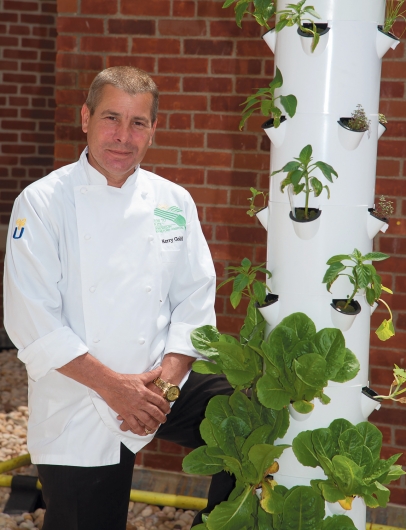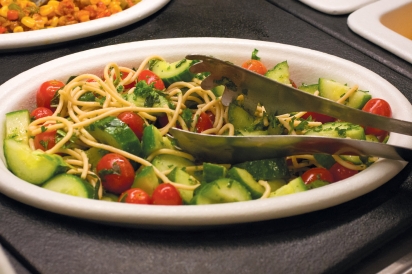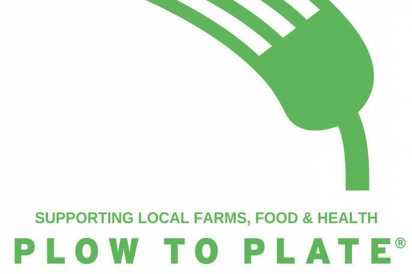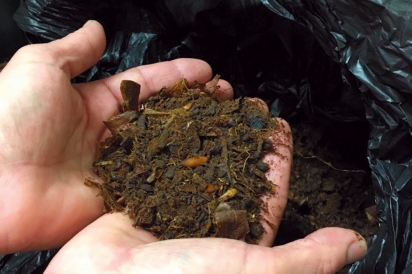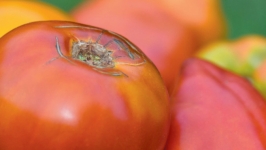Using Food to Heal Bodies and Community at New Milford Hospital
From Plow to Plate
When it comes to health, hospitals are perhaps best known for reactive procedures, using medicinal solutions to cure ills or surgery to fix more immediate problems. But a growing trend in healthcare is aimed towards what could be argued is a more holistic, preventative approach, and it is one that New Milford Hospital embraces in their innovative and successful Plow To Plate program.
Central to the program's mission are two ideas: that nutritious and enjoyable food is a key part of healing, and that the act of eating food is a vital part of social and community activity, which is equally important to longterm health.
Planning nutritious food choices for hospital patients is a group effort, and Food Services Director Kerry Gold, who has been with New Milford Hospital since 2008, takes pride in what his team is able to accomplish. Working with Undine Corporation (a fresh food service provider) allows them to do things that many other hospital kitchens cannot.
"We make our own stocks. We roast our own deli meats. We can control everything, so that allows us to be more healthful."
Larissa Zepko March is a clinical dietician with New Milford Hospital, and the freedom to control patients' food sources allows her to bring a wider range of healthy options to them.
"Instead of giving people commercial beverages to promote healing or weight gain, we have a program called 'Fresh Smoothies and Fresh Benefits' in which we make our own smoothies in place of those commercial beverages, using yogurt and fresh fruits and vegetables. Patients are more likely – especially within the elderly population – to drink that than they are something from a packaged bottle. We personalize things as much as we can. We see every patient, and we work with them and their families to make sure that the food is what they like. They're here to heal, and we want to make sure that we're giving them what they need to heal, but we also want them to be comfortable, which aids the healing process."
Part of the program's food procurement mission is fulfilled in ways that are familiar in homes but unique in a hospital setting. One part of that is growing vegetables onsite, and Plow To Plate has been growing its own vegetables since the program's inception in 2008.
"We started pretty small," Kerry Gold explains, "little containers, little pots, here and there. And next thing you know, we were growing pole beans down the fence line!"
Because of limited ground space around the hospital, Gold uses aeroponic growing towers that are placed on the roof. With these, he is able to supplement the kitchen's menu with freshly picked fruits and vegetables.
"One tower is strictly for herbs. Another is going to grow strawberries. One will have tomatoes. And any kind of vining plant – zucchinis, tomatoes, and things like that – will have its own space. And we have two container gardens that we'll plant in-ground. But we still have to partner with our local farms to meet our needs."
Raw goods from local farms represent a significant portion of what Kerry works with in his kitchen. Kerry was excited to show off 10 pounds of melons from Maywood Gardens Farm in Bridgewater. "They're huge! More like pumpkins than melons." The program also regularly sources from both Fort Hill Farm in New Milford and Marble Valley Farm in Kent.
In addition to purchasing locally, giving back to the community is an important part of the Plow To Plate program, and their composting efforts attest to that. Kerry estimates that the kitchen sees an average of 300 pounds of food waste returned every day. Instead of that being dumped into the general waste stream, they turn it into useable compost in a surprisingly short 14-hour cycle by using a Somat Pulper, which expedites the composting process. This compost is then given to local farms, free of charge.
The program's mission to provide support to the community is also fulfilled by providing residents with opportunities to interact and socialize, which is an important component in long-term, overall health. Community Outreach Coordinator Susan Twombly heads up this effort.
"One of our star programs is our Senior Supper initiative. We offer a 4pm and 5pm seating for seniors, where they can come together and enjoy a $5, three-course meal. We pair that with monthly programming. They're already coming together and breaking bread, and as an added amenity, we invite authors or medical and nutrition experts to speak at 6pm on the second Wednesday of every month. Of course, all of this is open to the community at large, as well."
Twombly also works with local restaurants to provide aspects of the Plow To Plate program outside the hospital. "We invite restaurants to carry our program's logo on their menu to identify healthier food choices, and we're very proud to be able to do that. Both Maggie McFly's and The White Horse Country Pub participate."
But the star of the Plow To Plate program is, undoubtedly, the food. "Today, for lunch, we have a pierogi bar," Kerry Gold explains. "We sauté the pierogis, onions, peppers, a little bit of sauerkraut, and some sour cream. We also have a double-dipped, crunchy pork loin with a honey garlic sauce. And then we have a grilled tuna burger on a brioche roll. You can have it with lettuce and tomato and go BLT-style, if you want, so long as you don't mind substituting fresh, all-white meat tuna," he says with a smile.
"We also do some cook-to-order, so for breakfast and lunch, you can come in and order a spinach and feta omelet or eggs over easy . . . whatever you'd like!"
And all of this comes at a surprisingly affordable price. Entrees run between $4 and $5, with sides for a bit extra. With the addition of a beverage, visitors can eat a full, well-rounded, and nutritious meal for around $8. This deal is not limited strictly to patients or seniors; the general public is always welcome to dine at the hospital.
Of course, nothing speaks better to the success of the Plow To Plate program than its popularity. In her role as Community Outreach director, Susan Twombly hears good things about the program from former patients. "After people have been discharged, they'll often tell me how heartening it was to have such great food. They'll mention that first." Larissa Zepko March gets similar feedback. "It's funny. We'll have people discharged and tell them, 'You can go home now!' and they'll say, 'Oh, no. I'll wait until after lunch.'"
The Plow To Plate program serves up breakfast, lunch, and dinner, weekdays 6:30am to 6:30pm, and breakfast and lunch on weekends and holidays 7am to 2pm. Weekly menus are available here.
New Milford Hospital: 21 Elm St., New Milford; 860-210-5341


